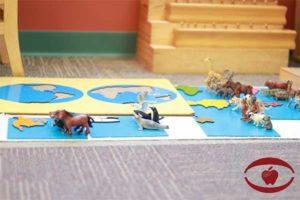
Kindergarten is a prime time for children to adjust to their primary school education. Therefore, the typical kindergarten curriculum is one of the most common things parents and educators discuss. Every institution develops its curriculum based on its academic policies and approaches.
However, each institution follows a consistent industry-wide framework. If you are curious about the subjects your child will learn in a kindergarten setting, here is a breakdown of the typical curriculum at this level.
Language Arts
Language arts is the foundation of early literacy. In kindergarten, teachers use various methods to teach and develop language skills. Kindergarten students learn to identify letters, recognize sounds, write simple words, read simple books, and understand basic grammar and punctuation. Most teachers start with words that the students recognize before they expand their vocabulary.
Children experience and develop basic phonemic awareness, or the ability to manipulate and recognize the individual sounds in language. The goal is to teach children the basics of reading and writing so that they can become successful readers and writers in the future.
Mathematics
Mathematics is an important subject for children in kindergarten. Teachers focus on developing basic number recognition, counting, and number relationships. Effective math lessons will help kindergarten children to at least sequence the first twenty numbers. Additional lessons include geometric shapes, with an emphasis on two-dimensional shapes first.
Finally, teachers can begin with basic arithmetic problems like addition and subtraction. Children learn the fundamentals of arithmetic when they add or subtract items to a group and recognize number sequences and their influence on the arithmetic problem.
Science
Science helps children explore their world and develop scientific thinking skills. Kindergarten science activities involve basic skills like time interpretation and season recognition. Teachers can start with easy interpretations like morning, noon, evening, and night. Also, they can instruct kids on how to name and recognize the four seasons and weather conditions.
Also, science lessons can include basic biology about body parts and senses. Songs like “head, shoulders, knees, and toes” can create a rhythm that increases correct body part recognition.
In kindergarten, children can learn about living things, the environment, natural resources, and physical processes like growth and change through various activities. Science teaches children to draw conclusions from observations, identify patterns, and think critically.
Social Studies
Social studies introduces children to the world around them and teaches them about different cultures, geography, history, and government systems. They can understand how they identify themselves and their role in the community.
Social Studies helps children learn about their community and its role in society. Through cultural appreciation and integration, children learn about how people interact with their environment and how to respect different beliefs and cultures.
Extra Skills
In addition to traditional academic subjects, kindergarten teachers develop various extra skills in their students. They can incorporate cognitive thinking skills such as problem-solving and logical reasoning to help them overcome academic challenges. Also, they can help them improve their focus and attention span.
Kindergarten children have a considerable physical growth spout, which necessitates the development of muscles, bones, and limbs. Thus, teachers can provide adequate space for movement and other activities. Also, they can help develop hand-eye coordination through drawing.
Instructors also teach children social skills that encourage cooperative behavior and self-control. For example, the teachers can encourage kids to make friends inside the classroom. Also, they can slowly build self-control with rules on how to behave in class.
Your child will require a learning environment that caters to their needs and ensures their steady development in academic, social, and other extra curriculum skills. Contact us at Miniapple International Montessori Schools to enroll your child in a private kindergarten class today.

